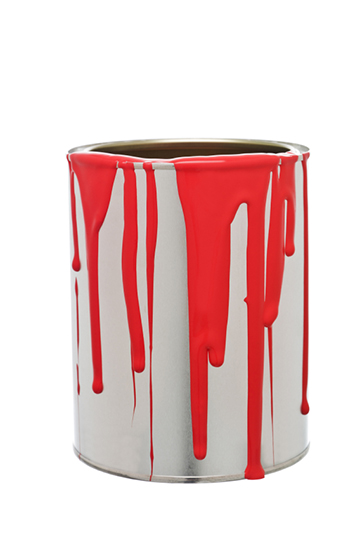A stack of old paint cans in the basement is as common as a gaggle of children at a zoo. Sometimes those cans are there for good reason. Maybe you want to be able to touch up the exterior paint of your home if it gets damaged during a storm, or the interior paint after it gets dinged moving the furniture around.
But sometimes that paint is sitting there because the homeowner does not know how to dispose of it. Here is some good news: Paint is fairly easy to reuse or recycle in a responsible matter. It may cost you some money (depending on the type of paint) or it may cost you nothing at all (depending on where you live). But, with a little research, you can get it to a good final resting place — and out of your basement, where it can be anything from a kid hazard to a fire hazard. We also have some tips for reducing the likelihood that you will have a pyramid of cans in your basement after your next painting project.
 Paint is made by combining a pigment (the color) with a binder (the substance that keeps the pigment in place). The typical can of paint will also contain a solvent, which thins the paint and makes it easier to apply, and several other additives that do things like help the paint dry faster and resist mold and fungi. Latex-based paint (also called acrylic paint) and oil-based paint are the most common household products on the market.
Paint is chock full of additives that can adversely affect the environment and human health. Latex paint contains crystalline silica, which can damage your lungs if it becomes airborne and is inhaled. Oil-based paint contains solvents that can cause headaches, dizziness, nausea and other symptoms if inhaled. There is some evidence that long-term exposure to these chemicals can cause even more adverse health effects.
In addition, older paints often contain lead or even mercury, both of which are extremely dangerous. It is important to dispose of paint carefully and correctly.
Paint is made by combining a pigment (the color) with a binder (the substance that keeps the pigment in place). The typical can of paint will also contain a solvent, which thins the paint and makes it easier to apply, and several other additives that do things like help the paint dry faster and resist mold and fungi. Latex-based paint (also called acrylic paint) and oil-based paint are the most common household products on the market.
Paint is chock full of additives that can adversely affect the environment and human health. Latex paint contains crystalline silica, which can damage your lungs if it becomes airborne and is inhaled. Oil-based paint contains solvents that can cause headaches, dizziness, nausea and other symptoms if inhaled. There is some evidence that long-term exposure to these chemicals can cause even more adverse health effects.
In addition, older paints often contain lead or even mercury, both of which are extremely dangerous. It is important to dispose of paint carefully and correctly.
What is paint?
 Paint is made by combining a pigment (the color) with a binder (the substance that keeps the pigment in place). The typical can of paint will also contain a solvent, which thins the paint and makes it easier to apply, and several other additives that do things like help the paint dry faster and resist mold and fungi. Latex-based paint (also called acrylic paint) and oil-based paint are the most common household products on the market.
Paint is chock full of additives that can adversely affect the environment and human health. Latex paint contains crystalline silica, which can damage your lungs if it becomes airborne and is inhaled. Oil-based paint contains solvents that can cause headaches, dizziness, nausea and other symptoms if inhaled. There is some evidence that long-term exposure to these chemicals can cause even more adverse health effects.
In addition, older paints often contain lead or even mercury, both of which are extremely dangerous. It is important to dispose of paint carefully and correctly.
Paint is made by combining a pigment (the color) with a binder (the substance that keeps the pigment in place). The typical can of paint will also contain a solvent, which thins the paint and makes it easier to apply, and several other additives that do things like help the paint dry faster and resist mold and fungi. Latex-based paint (also called acrylic paint) and oil-based paint are the most common household products on the market.
Paint is chock full of additives that can adversely affect the environment and human health. Latex paint contains crystalline silica, which can damage your lungs if it becomes airborne and is inhaled. Oil-based paint contains solvents that can cause headaches, dizziness, nausea and other symptoms if inhaled. There is some evidence that long-term exposure to these chemicals can cause even more adverse health effects.
In addition, older paints often contain lead or even mercury, both of which are extremely dangerous. It is important to dispose of paint carefully and correctly.